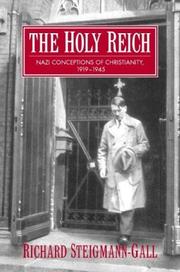| Listing 1 - 1 of 1 |
Sort by
|

ISBN: 9780521823715 9780511818103 9780521603522 0521603528 0521823714 9781461938309 1461938309 0511818106 1139883070 1107385822 1107383927 1107390354 1107398762 1107387434 Year: 2003 Publisher: Cambridge, UK New York Cambridge University Press
Abstract | Keywords | Export | Availability | Bookmark
 Loading...
Loading...Choose an application
- Reference Manager
- EndNote
- RefWorks (Direct export to RefWorks)
Analyzing the previously unexplored religious views of the Nazi elite, Richard Steigmann-Gall argues against the consensus that Nazism as a whole was either unrelated to Christianity or actively opposed to it. He demonstrates that many participants in the Nazi movement believed that the contours of their ideology were based on a Christian understanding of Germany's ills and their cure. A program usually regarded as secular in inspiration - the creation of a racialist 'people's community' embracing antisemitism, antiliberalism and anti-Marxism - was, for these Nazis, conceived in explicitly Christian terms. His examination centers on the concept of 'positive Christianity,' a religion espoused by many members of the party leadership. He also explores the struggle the 'positive Christians' waged with the party's paganists - those who rejected Christianity in toto as foreign and corrupting - and demonstrates that this was not just a conflict over religion, but over the very meaning of Nazi ideology itself.
German-Christian movement --- Chrétiens allemands (Mouvement) --- Chrétiens allemands (Mouvement) --- Christendom en antisemitisme --- Allemagne --- Histoire --- National socialism and religion. --- Christianity and antisemitism. --- Church and state --- Nazisme --- Christianisme et antisémitisme --- Eglise et Etat --- History --- History. --- Aspect religieux --- Germany --- Church history --- Politics and government --- Histoire religieuse --- Politique et gouvernement --- National socialism and religion --- Christianity and antisemitism --- 1933-1945 --- 20th century --- Antisemitism and Christianity --- Christianity and other religions --- Religion and national socialism --- Religion --- Judaism --- Third Reich, 1933-1945 --- Arts and Humanities --- Allemagne - Histoire - 1933-1945
| Listing 1 - 1 of 1 |
Sort by
|

 Search
Search Feedback
Feedback About UniCat
About UniCat  Help
Help News
News